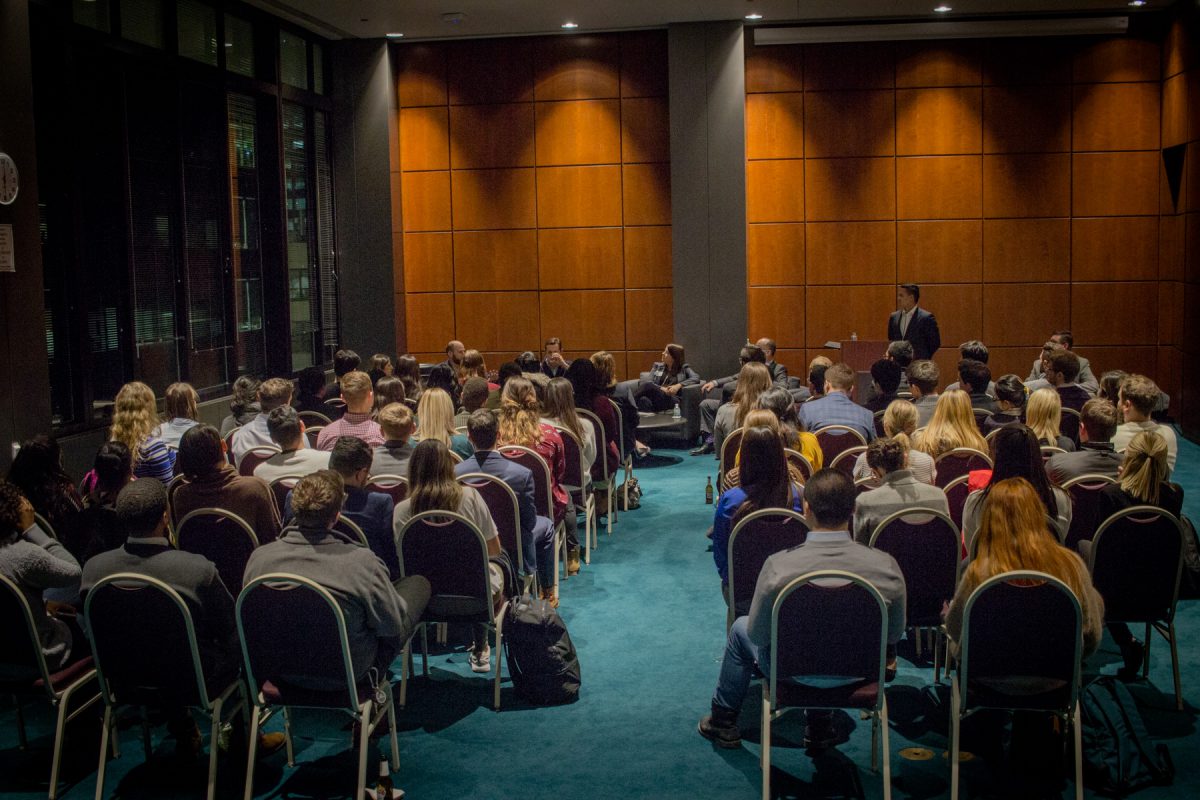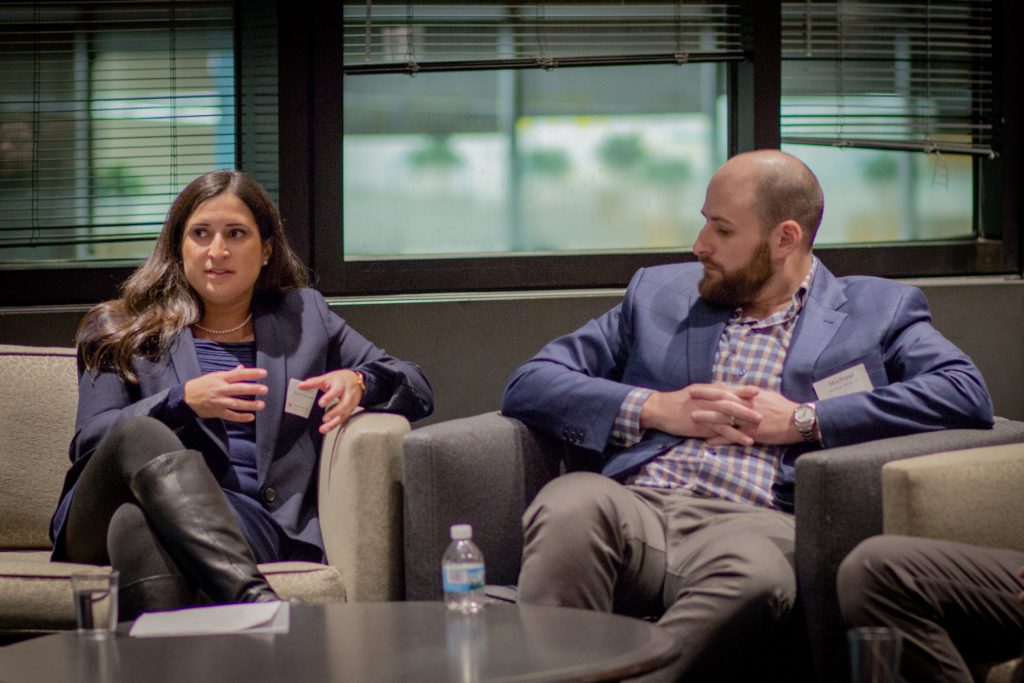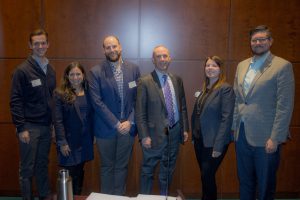
Victoria Ryan, Associate Director of Career Services, provided this recap of the panel discussion:
On January 29, a great group of students turned out on a very cold night in Chicago with sub-zero temperatures to hear a panel of six distinguished attorneys discuss their roles as in-house corporate counsel:
- David Susler – Associate General Counsel, National Material L.P.
- Matthew Hamielic ’17 – Associate Attorney, Innovation Law Department, Allstate
- Angela Frye ’97 – General Counsel, Great Lakes Market, Verizon Wireless
- Krystin Hernandez ’10 – Senior Counsel, McDonald’s Corporation
- Gavin Daly ’10 – Counsel, Corporate Investigations, Jones, Lang & LaSalle (JLL)
- Michael Ward ’12 – Associate Attorney, Riley Safer Holmes & Cancila
All but one panelist, Davis Susler, is a Chicago-Kent alumnus. Some of the panelists work for very large companies and others work in smaller companies. Angela Frye mentioned that her company, Verizon, employs over 600 lawyers, while Mr. Susler works in a two-attorney legal department at National Materials.
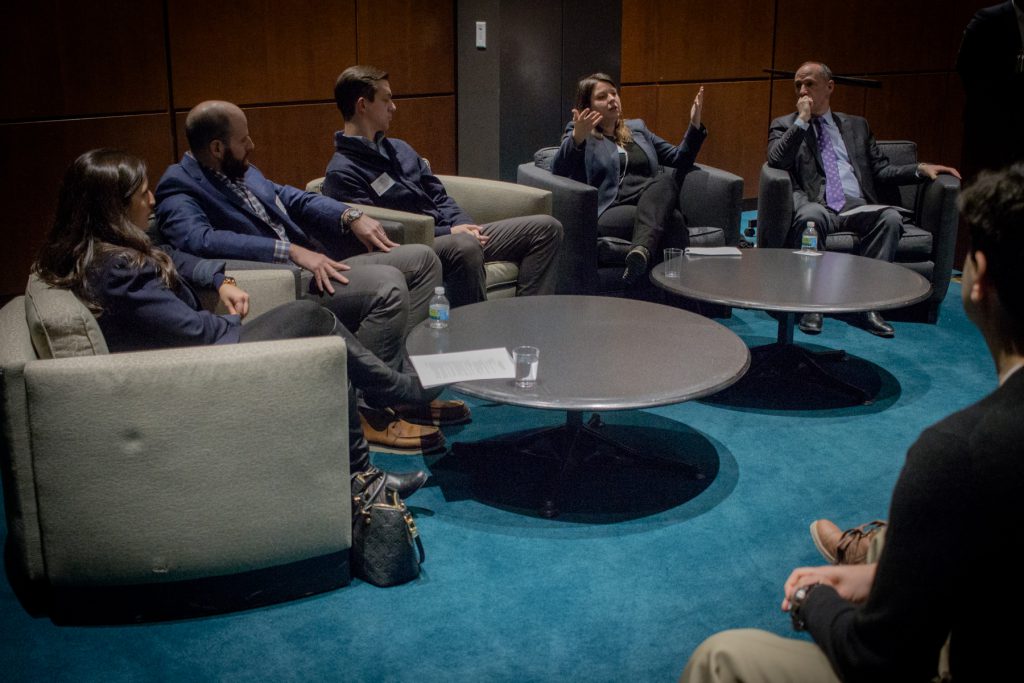 One recurring theme was that all of the panelists experience a great deal of variety on a day-to-day basis. An in-house role is frequently a “generalist” role, and it is hard to plan what you will be doing each day. Mr. Susler commented: “On a daily and weekly basis I am doing something I have not done before.”
One recurring theme was that all of the panelists experience a great deal of variety on a day-to-day basis. An in-house role is frequently a “generalist” role, and it is hard to plan what you will be doing each day. Mr. Susler commented: “On a daily and weekly basis I am doing something I have not done before.”
Differences Between In-House Counsel and Private Firms
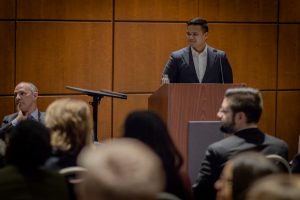 Rex Penaflorida, the student moderator, asked the panelists about the differences between working for a private firm and working in-house. All of the panelists agreed that the biggest difference is that in a private firm attorneys are under pressure to bill hours.
Rex Penaflorida, the student moderator, asked the panelists about the differences between working for a private firm and working in-house. All of the panelists agreed that the biggest difference is that in a private firm attorneys are under pressure to bill hours.
In contrast, one panelist pointed out that in-house attorneys are “rewarded for efficiency.” In-house counsel can add value when they perform legal tasks for their company that do not have to get farmed out to outside counsel or when they are monitoring outside counsel in such a way that the outside attorneys they hire are productive and efficient as well.
One panelist cautioned that in-house attorneys have to check their egos at the door. In a law firm, the attorneys are the “center of the universe”; whereas in a company, it is very possible that the employees in sales are more central to the company’s bottom line.
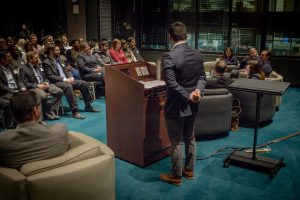 The trade-off is that in-house attorneys are in a unique position to provide practical legal advice that is tailored to their company’s business needs. In-house counsel have the opportunity to know their employer’s business so well and are generally much better at assessing business risks than outside counsel. They can give the business managers in their companies “peace of mind” that their business plans can move forward. The legal team is also in a good position to implement and oversee project management for the company.
The trade-off is that in-house attorneys are in a unique position to provide practical legal advice that is tailored to their company’s business needs. In-house counsel have the opportunity to know their employer’s business so well and are generally much better at assessing business risks than outside counsel. They can give the business managers in their companies “peace of mind” that their business plans can move forward. The legal team is also in a good position to implement and oversee project management for the company.
Breaking Into an In-House Role
The panelists were asked for their advice on how students can break into an in-house role. They were all in agreement that there is no one set path to achieving this goal and that “networking is key” and making the time to network is critical.
One panelist explained that networking is key because it allows people to make connections that might ultimately benefit them when they may not have the requisite experience for a position. However, networking is not about asking for a job but about meeting people and making connections with them.
 Mr. Susler urged the audience to “do really stellar work to build brand and reputation.” Then people in your network will be more willing to help you. Mr. Daly urged students to “make yourself indispensable” no matter where you are.
Mr. Susler urged the audience to “do really stellar work to build brand and reputation.” Then people in your network will be more willing to help you. Mr. Daly urged students to “make yourself indispensable” no matter where you are.
The panelists urged students to think more creatively about their careers. For example, Ms. Frye suggested that if someone was working in a private firm but had the goal of getting into an in-house legal department, they should seek out assignments that help them get the kind of skills they would need for an in-house role.
 They could also acquire these skills in a corporate setting outside of the in-house legal department. Mr. Daly urged students to think about their careers in 3-5 year increments. Mr. Hamielic closed out the discussion on breaking into an in-house role by remarking that there is a trend toward companies relying more on their in-house legal staff and expanding their in-house departments.
They could also acquire these skills in a corporate setting outside of the in-house legal department. Mr. Daly urged students to think about their careers in 3-5 year increments. Mr. Hamielic closed out the discussion on breaking into an in-house role by remarking that there is a trend toward companies relying more on their in-house legal staff and expanding their in-house departments.
Interview Tips
The moderator asked the panelists to provide tips on interviewing for in-house roles. Ms. Frye recommended that candidates need to be “passionate and positive about the company.” Ms. Hernandez from McDonald’s chimed in that it is a “big deal to be a brand champion.” She mentioned that when outside counsel disparage McDonald’s food, they do not get hired to do legal work for her company.
The panelists had a number of other great tips as well:
- Explain what is unique about you and how you will bring value.
- Show you are the kind of person the interviewer would want to invest in.
- Be very prepared to explain why you want this job.
- Respond to questions in a conversational style.
- Prepare good questions that include questions about the company’s business.
- Stay abreast of current events.
- Be familiar with the technique of behavioral interviewing.
- Dress conservatively for the interview.
Students were also cautioned not to get depressed when receiving lots of rejections for positions they have applied to but to keep moving forward until they get an offer for a role they want.
Diversity
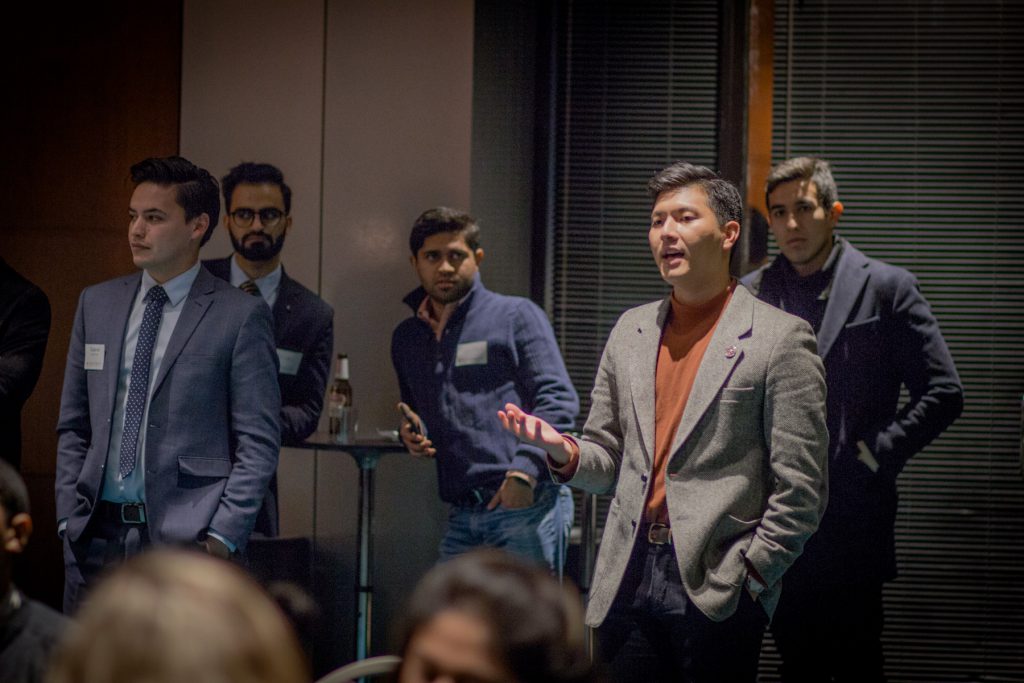 During the question and answer period, a student asked about the diversity policies for the panelists’ employers.
During the question and answer period, a student asked about the diversity policies for the panelists’ employers.
They all agreed that diversity was extremely important to their companies, which have all instituted formal diversity policies. They expected the outside firms they hired to work on their company’s legal matters to demonstrate that diverse attorneys were indeed working on these matters and receiving credit for their work.
One panelist mentioned that his company is seeking more local firms whose employee make-up more closely resembles that of the local population.
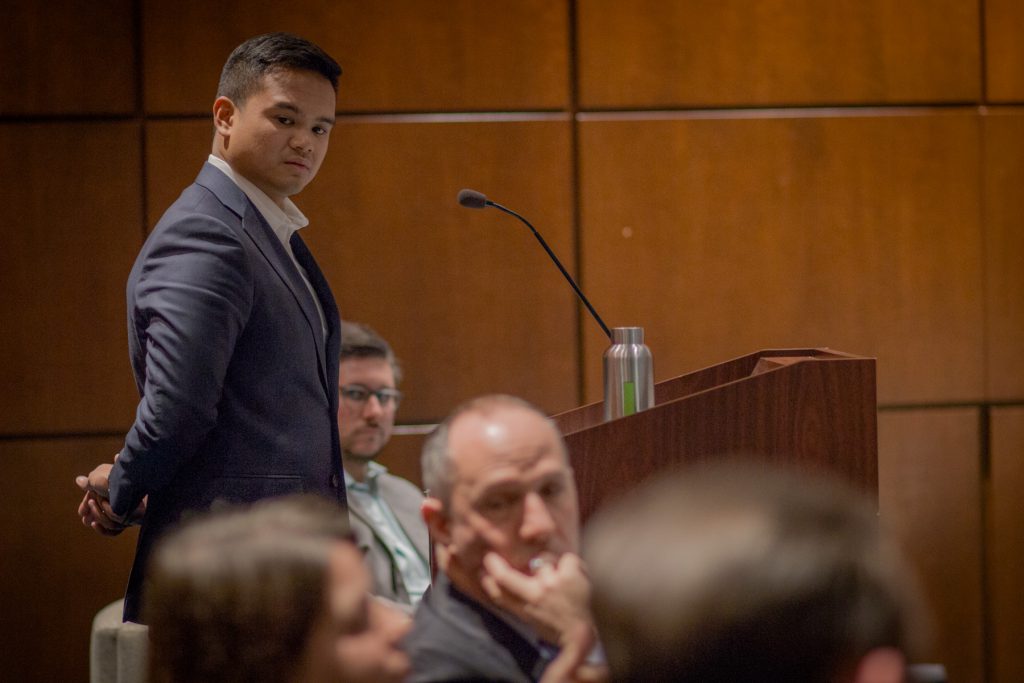
While the panelists had generally seen more improvement in the level of diverse associates in the firms they work with, they also thought there needed to be more emphasis on partner diversity.
The evening ended with a reception in which the students engaged in some lively conversations with many of the panelists.
Event Photos
Thanks to all of the organizations and staff departments that hosted this event: the Asian Pacific American Law Students Association, Black Law Students Association, Hispanic Latino Law Students Association, Corporate Law Society, Chicago-Kent Career Services Office, and the Chicago-Kent Alumni Association.

